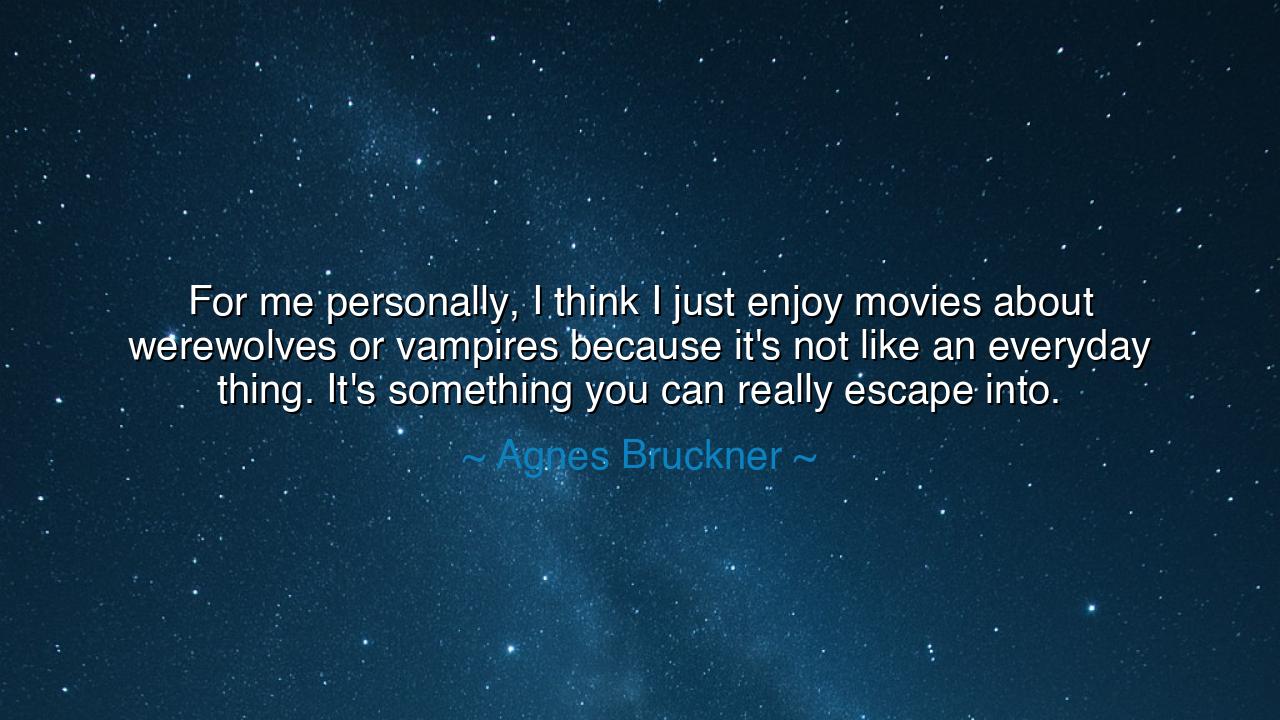
For me personally, I think I just enjoy movies about werewolves
For me personally, I think I just enjoy movies about werewolves or vampires because it's not like an everyday thing. It's something you can really escape into.






Ah, the words of Agnes Bruckner, whose fondness for stories of werewolves and vampires speaks to a deeper truth about the nature of escape, fantasy, and the human need to venture beyond the mundane. When she says, "For me personally, I think I just enjoy movies about werewolves or vampires because it's not like an everyday thing. It's something you can really escape into," she touches on a universal longing—the desire to break free from the ordinary and enter into realms that are otherworldly, where the boundaries of reality are redefined. In her words, there is a recognition that these fantastical worlds allow us to experience something extraordinary, something that pulls us from the ordinary struggles of everyday life into a place of imagination and transformation.
In the ancient world, the need for escape was just as powerful. The Greek gods themselves were symbols of the divine and the supernatural, transcending the ordinary human condition. People sought stories of gods, monsters, and heroes not just for entertainment, but for meaning. Consider the labors of Heracles, a hero whose feats transcended the limits of human strength, confronting creatures like the Nemean Lion or the Hydra. These tales were more than mere entertainment; they were myths of transcendence, allowing listeners to imagine a world beyond their struggles, where heroes could defy the impossible and achieve greatness. Similarly, Bruckner’s enjoyment of werewolves and vampires is rooted in this ancient tradition—the desire to escape the real world and enter a space where anything is possible, where even the most unimaginable becomes real.
The Greek tragedies, too, were forms of escape, though they often dealt with themes of fate and suffering. Characters like Oedipus or Antigone were caught in webs of fate that no mortal could escape, yet through their suffering, they also revealed the complex nature of human existence—struggle, loss, and redemption. The audiences of ancient Greece, though immersed in the tragic nature of these plays, were also transported to another world—a world where fate and destiny were explored in ways that allowed them to reflect on their own lives. In much the same way, Bruckner’s preference for supernatural films transports her to worlds where she can experience the impossible, the unfathomable, and the unreal, allowing her to reflect on the deeper truths of life without the constraints of everyday reality.
Consider also the Romantic poets, such as Shelley and Byron, who turned to supernatural themes in their works. Shelley’s "Frankenstein" is a perfect example—its themes of creation, loss, and the monstrous take us into a world where the ordinary laws of nature are bent and broken. These works were not mere flights of fancy but explorations of the human condition, confronting our deepest fears and desires through creatures and worlds that were not real. Byron’s "The Giaour" also contains vampiric themes, showing how the supernatural serves as a way to probe human emotions—guilt, love, and vengeance—through creatures that exist outside the bounds of normal life. Similarly, Bruckner’s attraction to werewolves and vampires reveals a shared longing to explore the darker and unknown aspects of ourselves in a way that is not bound by the constraints of our earthly existence.
Through these supernatural narratives, we are granted access to realms where the impossible becomes possible, where fear and desire are explored through figures like the vampire—a creature caught between the living and the dead—or the werewolf, a human who transforms into something wild and uncontrollable. These monstrous figures are often symbolic of the dualities within ourselves: the struggle between civilization and wildness, control and chaos. In watching these stories unfold, we are not merely escaping reality, but confronting our own shadows, our own contradictions, and our deepest desires. Bruckner’s enjoyment of such films, then, is not just about fantasy, but about engaging with the deeper aspects of the human psyche, those parts of us that long to break free from societal norms and embrace the untamed.
The lesson in Bruckner’s words is that we all have an innate need to escape, to explore worlds beyond the constraints of the ordinary. But this desire is not simply a flight from reality; it is a search for something deeper. Whether it is through the supernatural, like the worlds of werewolves and vampires, or through other forms of creative expression, we seek freedom, exploration, and the ability to touch something beyond the mundane. These journeys of escape allow us to confront our own fears, to question societal norms, and to experience the unknown in ways that our everyday lives may not permit.
Thus, the call to action is clear: embrace the worlds of imagination. Like Bruckner, allow yourself the freedom to explore the realms of the fantastical, for they hold not just an escape from reality, but a deeper engagement with the truths of the human condition. Allow yourself to venture beyond the everyday, not in avoidance, but in understanding, and recognize that through these fantasies, we can find greater truths about who we are and who we wish to become. Just as the ancient myths were more than mere stories of gods and monsters, so too are the supernatural narratives of today—tools through which we can explore the unknown parts of ourselves and the world, learning to live more fully in the process.






AAdministratorAdministrator
Welcome, honored guests. Please leave a comment, we will respond soon